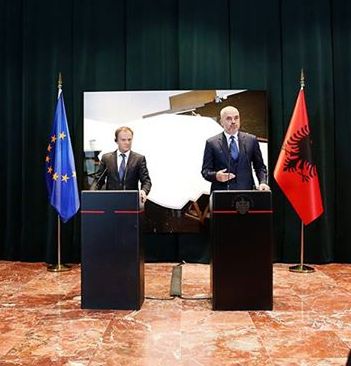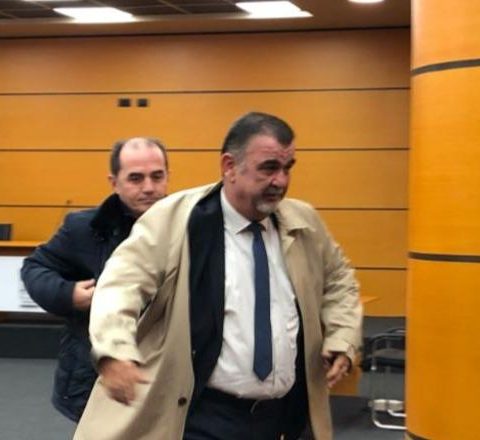
EU will work with the Western Balkans to address refugee crisis, Tusk says during Albania visit
TIRANA, Nov. 23 – Issues ranging from the flow of refugees making their way through the Western Balkans to the needed reforms for EU integration were in focus as the head of EU’s executive branch visited Tirana and the region over the weekend.
To address the refugee crisis, the EU will work together with non-member Western Balkan countries that are now part of a major transit route to the EU, Donald Tusk, the president of the European Commission, said at a Tirana press conference.
“The EU must help to manage the flow, as we are doing, and helping elsewhere to address the causes of the flow in the source countries,” he said.
Many of the refugees come from war-torn countries in the Middle East, but many others are simply fleeing poverty elsewhere.
Albania has so far not been part of the main corridor for refugees crossing the region, but there are worries that might change during the winter.
“Whether we are affected or not, Albania’s position has been and is clear: We are not Europeans in good days only. We are Europeans in bad days too,” Albanian Prime Minister Edi Rama said. “Unlike many Europeans who forget that they are Europeans when they have to deal with hard problems like the refugee crisis, we are determined to be part of any European plan and to contribute, even if modestly, in mitigating the effects of the crisis, on the humanitarian and the political ends for the EU.”
Western Balkan countries are not part of the EU or the Schengen area, but they hope to join one day. However, thousands of people from the Western Balkans also apply for asylum in the EU, trying to escape poverty at home.
The EU leader also commended the Balkan countries on dealing with the refugee crisis, “a very big challenge,” and assured them of Brussels continuous support to cope with it.
“We should all work together to treat this issue in a real partnership,” he said.
Tusk urged western Balkan countries to better guard their borders, in coordination with the bloc.
“We should efficiently control the external borders. We should do this together, in cooperation and coordination to be sure that the process is well organized and managed,” said Tusk.
Prime Minister Rama and President Tusk also spoke about the Albania’s EU integration process, where both said the implementation of a judicial reform was of paramount importance.
The two leaders also discussed the threat posed by terrorism, on which
Rama said there is no room for fear but Albanians should be vigilant.
“There is no room for panic or to change our daily lives,” Rama said. “Albania is no more and no less threatened than other countries.”
The two leaders reaffirmed the joint efforts in fight against terrorist networks globally.
Tusk said fighting terrorism is the greatest challenge currently facing Europe and added that freedom and solidarity are many times stronger than violence and fear.
“Today in Tirana, Paris, Brussels people feel the same hope and the same fear. But I believe that hope is much stronger than fear,” said Tusk at a news conference. “No one is alone today.”
Albania, has a large Muslim population and the country is well-known for its peaceful religious tolerance and coexistence. It has strongly denounced the terrorist acts and ranked alongside the Western powers in the global fight against terrorism.
Albania’s reforms’ process was another topic discussed by Tusk while in Albania, a country that hopes to launch full membership negotiations with the bloc next year.










